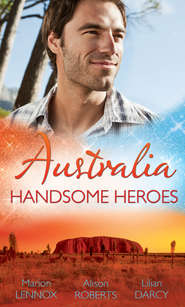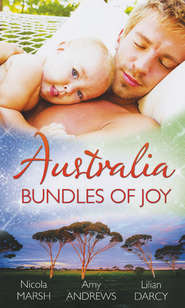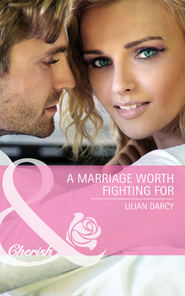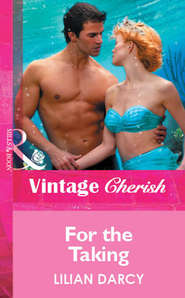По всем вопросам обращайтесь на: info@litportal.ru
(©) 2003-2024.
✖
The Australians' Brides: The Runaway and the Cattleman
Автор
Год написания книги
2019
Настройки чтения
Размер шрифта
Высота строк
Поля
Only the two of them.
Jac didn’t feel quite human tonight, alone with Callan in the desert. Watching the water hole for signs of movement, she heard his breathing, felt his body like a flannel-and-denim-covered magnet just inches away. A man like this gave masculinity a whole new meaning, reminded a woman that human beings were animals, too.
“We were a bit late for them, I guess,” he said, as they walked back toward the ring of barbecue stones in the creek bed. “It’s better when there’s still some daylight. We’ll make a special trip one day. You can bring your camera.”
She’d forgotten it on their picnic, today. “That would be great. Could we get up extra early and come at dawn? I just love the light and the air then.”
“We can climb Mount Hindley, watch the sunrise, make breakfast over the fire in the creek. Would that be good?”
“Oh, it would be wonderful!”
He gave her a look. They still hadn’t switched their flashlights on. “You sure you’re from L.A.?”
“Last time I checked.”
“You’re supposed to like shopping malls better than water holes, aren’t you?”
“I like new things.” She thought about it for a moment. “No, that’s not right. That sounds like I am talking shopping malls.” She tried again. “I like being made to see things in a new way. Like dawn.”
“Dawn is new?”
“It’s new for me. In L.A. dawn means you stayed out late at a party, or you had to set the alarm early for a flight. If you do see the sunrise, you only see it through glass. You don’t smell it, or feel the dew falling on your skin. Here, dawn is … yes, new. It notches my senses up higher, makes me aware. And writers need that. Writers—” She stopped.
There was an old, fallen eucalyptus tree lying on the creek bed at this point. Its trunk was as big as a concrete culvert pipe, as hard and smooth as iron. Without taking his eyes from her face, Callan leaned his lower back against the curved wood as if the two of them had all the time in the world. He put his flashlight down on the tree trunk beside him, tested its balance for a moment, then let it go.
“Tell me about writers,” he prompted.
But Jacinda shook her head and closed her eyes against the idea. “Doesn’t matter.”
“No, it was important,” Callan insisted. “I was interested. Say it.”
She faced him, ignoring the invitation in his body language that told her to lean against the horizontal trunk, too. Those bells of awareness weren’t so distant or so faint, now. The breeze had carried the sound this way and it was clearer, much closer. But she still had the freedom to ignore the bells, if she wanted.
“I don’t know if I’m a writer anymore, that’s all,” she said. “I think it’s gone. Was it ever really there, I wonder?”
“Hey, you made a living at it.”
“I had an ear for dialogue, and I could make those crazy soap-opera plot twists semibelievable when I put the right words into the characters’ mouths. Was it ever more than that? If it was, I can’t remember.” She laughed, moved a little closer to him, although she was barely aware of it, and reached her hand out to the tree trunk. It wasn’t white or gray, it was silver, and scoured to satin by years of sun and wind. “I have this novel somewhere,” she confessed. “Not finished. Miles from finished. A few early chapters and some notes, and snatches of dialogue from a couple of big scenes later on.”
“Was it any good?”
“Listen to you, asking me something like that!” She laughed and leaned her hip against the wood. They were like two strangers propped at a bar, trading life stories with loosened tongues.
“It’s a really naive question, isn’t it?” he said. “Sorry.”
“No, no, it’s not naive. Well, I guess it is. But it’s good naive. No one in L.A. would ever ask that question because of course I’m going to say it’s good. I’m trying to sell it, aren’t I? I’m going to put the right spin on it, package it into a sound bite. Do you know there are people in the industry there who can talk up a project so well that they get development money for script after script even when they’ve never actually written a word?”
“They’re the ones who sound like they’re not writers.”
“Truth is, Callan, I have no idea if my novel is any good. I have no idea if it’s important. Finishable. Remotely saleable. I just have no idea.”
“But you must have known, once.”
“I think it’s been dying inside me for a long time.”
“But you think dawn in the North Flinders Ranges might bring it back.”
She shook her head again.
“Yes.” He rolled his body ninety degrees so that they faced each other. “Because that’s where this started. You were telling me why you loved our dawn, and why you needed to see new things. Because you’re a writer.”
“Let’s find Lockie’s Game Boy.”
“You hope you can get it back. Being a writer, I mean.” He put his hand on her arm. “You really want to get it back. It’s important to you.”
“It’s not your problem, Callan.”
“No, but I can understand—” He stopped suddenly. “No, you’re right, it’s not my problem.”
She knew there was more he wanted to say. Or didn’t want to say, but could have said. The words stayed locked inside him, powerful and important in some way.
Stuck.
Too scary.
Her thigh was pushing lightly against his. They weren’t pretending anymore. He held her softly, weighing their options as he weighed her in his arms. Let each other go, or pull tighter? Hey, Jac? What do you want? The same as me? Yes, I know what you want ….
She looked up into his face.
New.
She hadn’t known him at all two months ago, and even after the magazine article and the cocktail party, this face had only existed in her memory like a few snapshots and video clips. E-mailing him, she had remembered the first smile of relief he’d given her when he’d realized she wasn’t serious about the Outback Wives thing, either, and his quiet good manners the following evening when he’d brought her and Carly the gift and the flowers.
She’d kept his picture from the magazine and, to be honest, she’d looked at it a couple of times. Learned it by heart, along with all the things the picture said about him.
New, but fascinating.
He wasn’t smiling. His mouth was flat and closed and smooth. She liked its shape. She loved his eyes, and the lines of his brows and jaw. Above his mouth, she found a small stretch of skin that he’d missed this morning when he’d shaved. She brushed it with the ball of her thumb, the way she’d have brushed a streak of dirt from Carly’s face, and it felt rough.
She waited for him to make the next move—it sounded too clinical and cold, putting it like that—but he didn’t. He didn’t let her go, either, just kept that light hold, and watched her watching him. She could still feel the roughness of the beard stubble on her thumb, long after she’d taken her hand away. The tension built and became unbearable. He bent his head, suddenly, and pushed his forehead against her neck, whooshing out a breath into the soft angora of her sweater.
“Oh, Lord, Jacinda!”
“I want to kiss you,” she blurted out, because someone had to say it, someone had to take some action.
“I want to kiss you, too.”
“So do it. Please?”











